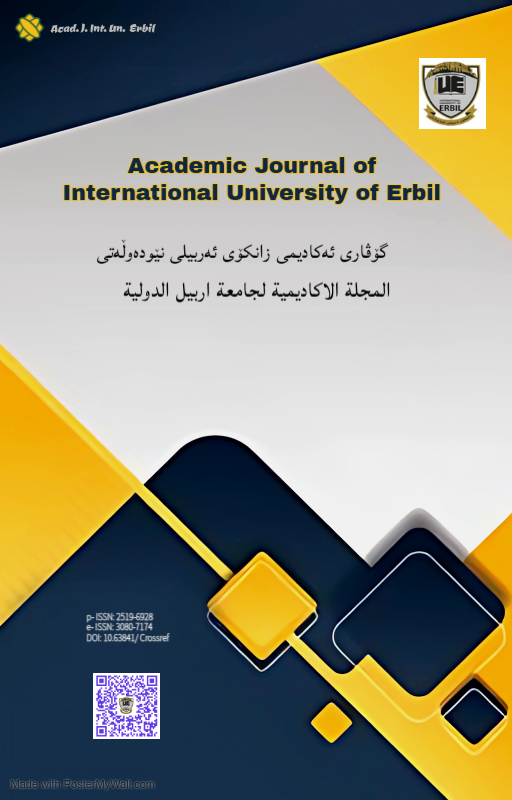The Impact of Legal Framework on Accounting Practices and Financial Transparency in Iraqi Banks (2010 - 2024)
Impact of Legal Framework on Accounting Practices and Financial Transparency in Iraqi Banks
DOI:
https://doi.org/10.63841/iue24534Keywords:
Financial Transparency, Legal Compliance, IFRS, Audit Regulation, Anti-CorruptionAbstract
This paper examines how legal frameworks and institutional structures influence accounting practices and financial transparency within the Iraqi banking industry from 2010 to 2024. Based on a balanced panel dataset of 47 banks derived using official data, which comprise the Central Bank of Iraq, and published annual bank data, the study determines some main determinants of transparency. The use of International Financial Reporting Standards (IFRS), strict exercise of anti-corruption, efficacy of audit, and judicial regimes of administration have been identified to drastically improve financial disclosure. The impact of the clarity of the tax law is less extensive, although statistically significant. However, contrary to this, the size of a company does not have a great influence on transparency; thus, the quality of governance is more influential than the size of the organization.
In an endeavor to deal with the possible endogeneity of the research and variation over time in the panel data, the research uses the Generalized Method of Moments (GMM) estimation procedure. The approach is more suitable with the lagged financial panel data, as it is used in providing unbiased and efficient estimates. Diagnostic tests indicate robustness in the model, such as the Hansen J-statistic and no second-order autocorrelation.
The results have viable suggestions for policymakers and banking regulators in Iraq. The response to this is increasing the enforcement of the law, enforcing compliance with international standards, and enhancing institutional oversight, and as a result, all this has been able to strengthen the credibility and reliability of the financial report. These experiences and lessons are especially useful to new and post-conflict economies interested in modernization of their financial systems and in foreign investment.
Downloads
References
M. Mazhari, A. Mulaee, S. Hossein M. Hashjin, and K. Abdullah Mustafa, “A comparative review of financial corruption prevention strategies in the republic of Iraq,” Revista De Gestão E Secretariado, vol.15, no.7, p. e3798, 2024.
T. Ahmad, and A. H. Alyamoor, “The Extent of Commitment of Iraqi Commercial Banks to The Disclosure and Transparency Requirements of Corporate Governance Principles Issued by The Central Bank of Iraq,” Review of International Geographical Education (RIGEO), vol. 11, no. 4, pp. 92–106, 2021, doi: 10.33403/rigeo.
B. H. Mohammed, H. Rasheed, R. Wahhab, and A. J. Al-Waeli, “The Impact of Mandatory IFRS Adoption on Accounting Quality: Iraqi Private Banks,” 2020. [Online]. Available: https://www.researchgate.net/publication/342262263
P. Sharma, “The Transformative Role of Blockchain Technology in Management Accounting and Auditing: A Strategic and Empirical Analysis,” Journal of Information Systems Engineering and Management, vol. 10, pp. 197–210, 2025, doi: 10.52783/jisem.v10i17s.2719.
M. C. Jensen and W. H. Meckling, “Theory of the firm: Managerial behavior, agency costs and ownership structure,” Journal of Financial Economics, vol. 3, no. 4, pp. 305-360, 1976.
ريباز سالار عبدالرحمن, سريوان لطف الله عبدالله, هريم احمد,أثر لجنة التدقيق على مصداقية القوائم المالية فى ظل [6] حوكمة الشريكاتhttp://jgu.garmian.edu.krd
H. F. Wheeb, “The Legal System of Banking Inspection Legal Study,” Russian Law Journal, vol.11, no.11s, pp.1945, 2023. https://doi.org/10.52783/rlj.v11i11s.1945
N. A. Fatah, H. A. Hamad, and K. S. Qader, “The Role of Internal Audit on Financial Performance Under IIA Standards: A Survey Study of Selected Iraqi Banks,” Qalaai Zanist Scientific Journal, vol.6, no.2, pp. 1028-1048, 2021, doi: 10.25212/lfu.qzj.6.2.38.
D. Ahmed, Z. Azhar, and A. J. Mohammad, “Kurdish Studies The Role of Corporate Governance on Reducing Information Asymmetry: Mediating Role of International Standards for Accounting (IAS, IFRS),” Jan. 2024, doi: 10.58262/ks.v12i1.119.
M. Ahmed, I. Naeem, M. S. Ahmed, O. H. Ali, and I. N. Hasan, “International Journal of Business Diplomacy and Economy Impact of IAS IFRS on Reducing Information Risk and Enhancing Financial Performance in Iraq,” International Journal of Business Diplomacy and Economy, vol. 2024, no. 3, pp. 83–89, 2024, [Online]. Available: http://inter-publishing.com/index.php/IJBDE
K. A. Hassan, “Changes in Stock Values under Accounting Disclosure Transparency: An Empirical Study on a Sample of Iraqi Banks Registered on the Iraq Stock Exchange,” International Journal of Studies in Business Management, Economics and Strategies, vol.3, no.12, pp.11-312024. [Online]. Available: https://www.researchgate.net/publication/387460402
M. Mazhari, A. Mulaee, S. Hossein, M. Hashjin, and K. A. Mustafa, “Mechanisms of Financial Transparency and Administrative Integrity in International Documents and Their Application in the Statute Law of the Republic of Iraq,” Russian Law Journal vol. XI, no. 5, pp. 3092- 3104, 2023.
L. Khaled Jaafar and K. Salman Mohammed, “the impact of financial and administrative corruption on tax revenues for financing state public budget,” International Journal of Studies in Business Management, Economics and Strategies, vol3, no3, pp. 166-184, 2024. [Online]. Available: https://www.researchgate.net/publication/379598366
P. Nijkamp, K. Kourtit, and T. P. Dentinho, “Infrastructure Reconstruction Planning in Post-Conflict Areas–a Multidimensional Resilience Assessment for Iraq,” Planning Practice and Research, vol.40, no.4, pp. 733-757, 2025, doi: 10.1080/02697459.2024.2440258.
Z. Altahaan, and D. Dobslaw, “Assessing Long-Term Post-Conflict Air Pollution: Trends and Implications for Air Quality in Mosul, Iraq,” Atmosphere (Basel), vol. 16, no. 7, p. 756, Jun. 2025, doi: 10.3390/atmos16070756.
M. Areliano, and O. Boverb, “Another look at the instrumental variable estimation of error-components models,” Journal of Econometrics, vol.68, no.1, pp.29-51, 1995.
H. Abdullah, and T. Tursoy, “Capital structure and firm performance: evidence of Germany under IFRS adoption,” Review of Managerial Science, vol. 15, no. 2, pp. 379–398, Feb. 2021, doi: 10.1007/s11846-019-00344-5.
Downloads
Published
Issue
Section
License
Copyright (c) 2025 Academic Journal of International University of Erbil

This work is licensed under a Creative Commons Attribution-NonCommercial-NoDerivatives 4.0 International License.












